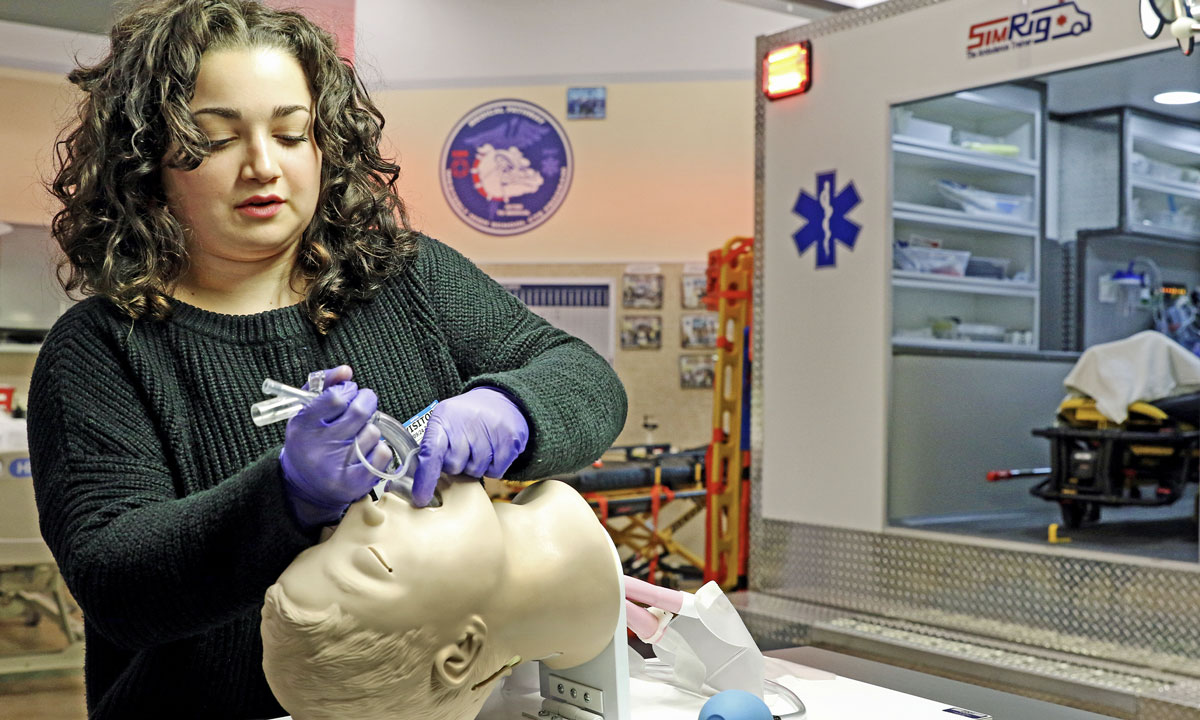How Rhode Island Is Tapping Career & Technical Ed to Help Every Student Succeed
Infante-Green: From fish farming and hydroponics to medical diagnosis, state offers 300 CTE programs for students regardless of address or income.

Get stories like this delivered straight to your inbox. Sign up for The 74 Newsletter
As education commissioner of Rhode Island, I have the privilege of visiting schools regularly. On any given day I might be reading to elementary students, observing a high school algebra class or, just as likely, enjoying lunch from a student-run business, learning about fish farming and hydroponics, or hearing students diagnose heart disease in an exercise that mirrors a real-world clinical setting.
Those last three examples offer a glimpse into the nearly 300 career and technical programs available to Rhode Island high school students, a 30% increase since 2019.
These aren’t the CTE programs of the past, remnants of an outdated track for at-risk students whom traditional high schools didn’t serve well. Historically, CTE failed to help students get to and through college or on a path toward future-ready careers and economic stability. In Rhode Island, we’re changing that reality and hope to serve as a model for others.
Today, students in our CTE programs take three or more courses that help them earn industry- credentials on top of other rigorous academic classes we expect all high schoolers to take, including four years of college-ready math. Additionally, many take free college courses while still in high school and enroll in Advanced Placement classes. Rhode Island has the highest rate of growth for students earning a passing score of 3 or higher on AP tests, and many of them participate in CTE programs.
Improving outcomes for students is critical as the nation recovers from the pandemic’s disruption to education. Student achievement took a huge hit, as seen on the Nation’s Report Card and other measures. And leading economists predict that will have a lasting impact on students’ earnings and other outcomes, unless policymakers come up with innovative recovery strategies.
In Rhode Island, we’ve grown and strengthened career and technical programs following conversations with students that revealed many felt a disconnect between what they wanted for their futures and the opportunities schools prepared them for. Students are much more engaged when they see their learning experiences as purposeful, and engagement is especially critical now, amid the nation’s chronic absenteeism crisis.
We also sat down with employers to improve the quality of our CTE offerings. We redesigned learning standards for each of these programs to ensure they helped students develop the knowledge and skills employers say are needed. And we’ve formed partnerships with businesses that have led to real opportunities for young people. For example, General Dynamics Electric Boat, which builds submarines essential to national security, hosts annual “signing days.” This year, nearly 100 Providence Public Schools seniors who were either enrolled in a CTE program or expressed interest in a career in the trades were offered full-time jobs once they graduate, with starting salaries around $60,000.
I also love hearing individual stories about students, like Macey Nenna, forging their own path. She received her emergency medical technician certification while attending Westerly High School and is now working toward her nursing degree at Rhode Island College. Since she earned college credit while in high school and can make money as an EMT, she’s in a vastly better financial position than most college students. And her twin brother, Michael — who participated in a construction CTE program at Westerly High School and interned with a civil engineer — is studying engineering at the University of Rhode Island and runs his own landscaping business.
We’re so committed to making opportunities like these available to all students that we allow students to attend CTE programs outside their home school or district if a similar program isn’t available there. Students can attend a school that has a CTE program they’re interested in, regardless of their zip code or family background. Furthermore, schools work hard to improve existing programs and build new ones when demand is there.
We’ve also made it a priority to ensure our programs are inclusive of differently abled students, through targeted grant funding that provides CTEnteachers in every district who are trained to meet the needs of students with learning differences and individualized education plans. The training has included coaching, guidance on modifying instruction and assignments, and instruction in making learning experiences and workspaces accessible.
I’m the proud mom of a differently abled high schooler. It’s great to know schools in Rhode Island are not placing unnecessary barriers on his, or any other student’s, opportunity to learn and thrive.
Parents and educators want all students to have the kind of educational experiences that ignite big dreams and build bright futures. CTE programs like the ones we’re offering in Rhode Island can help serve those goals by being centered on student interests and employer needs, are rooted in academic rigor and are forward-looking.
Get stories like these delivered straight to your inbox. Sign up for The 74 Newsletter

;)
